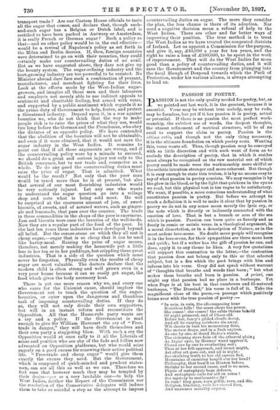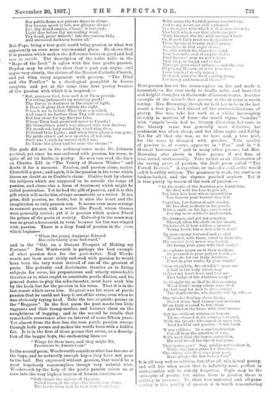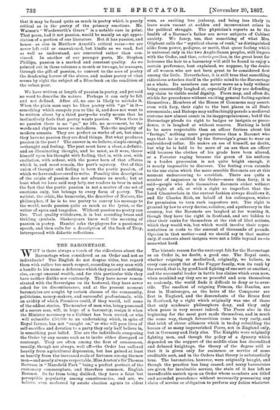PASSION IN POETRY.
PASSION is not the only quality needed for poetry, but, as we pointed out last week, it is the greatest, because it is essential. Verse may be without true melody, may be rude, may be formless, but yet if it has passion it is poetry, actual or potential. If there is no passion the most perfect work- manship, the subtlest use of words, the deepest thoughts, the utmost refinement of metrical structure, will be of no avail to support the claim to poetry. Passion is the ultima ratio, and though not the only thing necessary, it is the ultimate foundation on which poetry rests. Wanting this, verse wants all. Thus, though passion may be conveyed with so little discretion and with such want of form as to exclude the description of poetry, that in which it resides must always be recognised as the raw material out of which poetry could be made were the workmanship more skilful or the artistic intention stronger and more coherent. But though it is easy enough to state this truism, it is by no means easy to
say of what passion in poetry consists. We may recognise it by
the glow in the blood, or by the light that quickens in the eye as we read, but this physical test is too vague to be satisfactory. We want, if possible, a more conscious understanding of what constitutes passion in poetry. But before we attempt to
reach a definition it is well to make it clear that by passion in poetry we do not in any sense mean merely the lyric cry, or
the note which is directly or indirectly connected with the emotion of love. That is but a branch or arm of the sea which is passion. Passion can burn quite as fiercely and as freely in comic or satiric verse, in a theological argument, in a moral dissertation, or in a description of Nature, as in the most ardent love-scene. No doubt more people will recognise it in the love-scene, for their sympathies are there more keen and quick ; but if a writer has the gift of passion he can, and does, apply it to any theme he likes. A very few quotations will support this contention to the letter,—the contention that passion does not belong only to this or that selected subject, but is a fire which the poet brings with him and infuses into his verse. Gray did not speak without warrant of "thoughts that breathe and words that burn ; " but what makes them breathe and burn is passion. A priori, one might say that passion had no place in a burlesque. Yet when Pope is at his best in that cumbrous and ill-natured burlesque, " The Dunciad," his verse is full of it. Take the magnificent close of the poem,—a passage which positively
brims over with the true passion of poetry :—
" In vain, in vain, the all-composing hour Resistless falls ! the muse obeys the power. She comes ! she comes! the sable throne behold Of night primeval, and of Chaos old. Before her, fancy's gilded clouds decay, And all its varying rainbows die away. Wit shoots in vain his momentary fires, The meteor drops, and in a flash expires. As one by one, at dread Medea's strain, The sickening stars fade off the ethereal plain; As Argus' eyes, by Hermes' wand oppresed, Closed one by one to everlasting rest; Thus at her felt approach, and secret might, Art after art goes out, and all is night : See skulking truth to her old cavern fled, Mountains of casuistry heap'd o'er her head ! Philosophy, that lean'd on Heaven before, Shrinks to her second cause, and is no more. Physic of metaphysic begs defence, And metaphysic calls for aid on sense See mystery to mathematics fly !
In vain! they gaze, turn giddy, rave, and die. Religion, blushing, veils her sacred fires, And unawares morality expires.
Nor public flame nor private dares to shine: Nor human spark is left, nor glimpse divine! Lo ! thy dread empire, Chaos ! is restored; Light dies before thy uncreating word: Thy band, great Anarch ! lets the curtain fall ; And universal darkness buries all."
But Pope, being a true poet, could bring passion to what was apparently an even more uncongenial place. He shows that it is passion which makes the difference between good and bad vers de societe. The description of the toilet table in the "Rape of the Lock" is aglow with the true poetic passion.
Dryden may be cited to show that a poet can argue, and argue very closely, the claims of the Roman Catholic Church,
and yet wing every argument with passion. " The Hind and the Panther" is a theological pamphlet in heroic couplets, and yet at the same time true poetry because
of the passion with which it is inspired :—
"But, gracious God, how well dost Thou provide For erring judgments an unerring guide !
Thy throne is darkness in the abyss of light, A blaze of glory that forbids the sight. 0 teach me to believe Thee thus concealed, And search no farther than Thy self revealed; But her alone for my director take, Whom Thou halt promised never to forsake!
My thoughtless youth was winged with vain desires; My manhood, long misled by wandering fires, Followed false lights ; and when their glimpse was gone, My pride struck out new sparkles of her own.
Such was I, such by nature still I am; Be Thine the glory and be mine the shame 1"
The gods did not in the ordinary sense make Dr. Johnson poetical, yet since he was endowed with passion, his verse, in spite of all its faults, is poetry. No man can read the lines on Charles XII. in " The Vanity of Human Wishes " and doubt it for a moment. Passion, and passion alone, makes Churchill a poet ; and again, it is the passion in his verse which leaves no doubt as to Crabbe's claim. Crabbe took by choice the subjects which are supposed to be outside the range of passion, and chose also a form of treatment which might be called passionless. Yet he had the gift of passion, and it is this gift which will make him always memorable as a writer. It is a grim, dull passion, no doubt, but it stirs the heart and the imagination as only passion can. It seems even more strange to connect passion with a writer like Praed, whose themes
were generally trivial; yet it is passion which makes Praed the prince of the poets of society. Calverley in the same way was so great a humourist in verse because his fun was winged with passion. There is a deep fund of passion in the -,■oem
which begins-
" When the young Augustus Edward Has reluctantly gone bed-ward,"
and in the " Ode on a Distant Prospect of Making my Fortune." But Wordsworth is perhaps the best example of what passion does for the poet-writer. Had Words- worth not been most richly endowed with passion he would have been the very worst instead of one of the greatest of poets. His pedantic and doctrinaire theories as to fitting subjects for verse, his preposterous and utterly unworkable theories as to what ought to constitute poetic diction, and his general desire to play the schoolmaster, must have sunk him by the heels but for the passion in his verse. That it is in the last resort which saves him. So great was his store of poetic passion that he could not keep it out of his verse, even when he was obviously trying hard. Take the two exquisite poems on the "Beggars." In the first poem the poet meets two little vagrants and their tramp-mother, and lectures them on the naughtiness of begging ; and in the second he recalls that remarkable occurrence after an interval of some fifteen years. Yet almost from the first line the true poetic passion sweeps
through both poems and makes the words barn with a hidden fire. It is in the first of these poems that occur, as a descrip- tion of the beggar boys, the enchanting lines:— "Wings let them have, and they might flit, Precursors to Aurora's car."
In the second poem, Wordsworth considers what has become of the boys, and he naturally enough hopes they have not gone to the bad. But expressed without passion, that would be a most hopelessly commonplace though very natural wish. Wordsworth by the help of the poet's passion raises us at once into the very highest heaven of human emotion :—
"Soft clouds the whitest of the year Sailed through the sky—the brooks ran clear; The lambs from rock to rock were bounding ;
With songs the budded groves resounding ; And to my heart are still endeared The thoughts with which it then was cheered; The faith which saw that gladsome pair Walk through the fire with unsinged hair.
Or, if such faith must needs deceive—
Then, Spirits of beauty and of grace, Associates in that eager chase; Ye, who within the blameless mind
Your favourite seat of empire find—
Kind Spirits ! may we not believe That they, so happy and so fair Through your sweet influence, and the care Of pitying Heaven, at least were free
From touch of deadly injury
Destined, whate'er their earthly doom, For mercy and immortal bloom !"
Here passion has set the commonplace on fire and made it immortal,—a fire ever ready to kindle noble and beautiful and helpful thoughts in thousands of human hearts. Another example of the miracle that passion works in verse is worth noting. Mrs. Browning, though we hold her to be in the last resort a true poet, had almost all the contra-indications of poetry. She was, take her work as a whole, incorrigibly slovenly in matters of form—she would rhyme "candles" with "angels"—she had no literary discretion, her taste in the literary sense was generally most defective, her sentiment was often cheap, and her ideas vague and flabby. Yet for all that she was, as we have said, a true poet, for the verse is stamped with passion. This quality of passion is, of course, apparent in " Pan " and in "A Musical Instrument" and in many other poems ; but Mrs. Browning also shows in these poems, if not fine, at least sound, workmanship. Take rather as an illustration of the saving grace of passion, the little poem called "The Forced Recruit." A superfine, or indeed a cold, critic would call it horribly written. The grammar is weak, the sentences broken-backed, and the rhymes patched anyhow. Yet it is true poetry by reason of the rush of passion :— " In the ranks of the Austrian you found him, Ho died with his face to you all ;
Yet bury him hero where around him You honour your bravest that fall.
Venetian, fair-featured and slender, He lies shot to death in his youth, With a smile on his lips, over tender For any mere soldier's dead mouth.
No stranger, and yet not a traitor,
Though alien the cloth on his breast, Underneath it how seldom a greater Young heart, has a shot sent to rest !
By your enemy tortured and goaded To march with them, stand in their file, His musket (see) never was loaded, He facing your guns with that smile !
As orphans yearn on to their mothers, Ile yearned to your patriot bands ;- `Let we die for our Italy, brothers, If not in your ranks, by your hands!
'Aim straightly, fire steadily ! spare me A ball in the body which may Deliver my heart here, and tear me This badge of the Austrian away !'
So thought he, so died he this morning. What then? many others have died.
Ay, but easy for men to die scorning
The death-stroke, who fought side by side :- One tricolor floating above them;
Struck down 'mid triumphant acclaims Of an Italy rescued to love them
And blazon the brass with their names.
lint he—without witness or honour, There, shamed in his country's regard, With the tyrants who march in upon her, Died faithful and passive : 't was hard.
'T was sublime. In a cruel restriction Cut off from the guerdon of sons, With most filial obedience, conviction, His soul kissed the lips of her guns.
That moves you ? Nay, grudge not to show it, While digging a grave for him here : The others who died, says your poet,
Have glory,—let him have a tear."
It is all very well to criticise, but after all this is real poetry, and will live when much that is infinitely more perfect in workmanship will be utterly forgotten. Style may be the antiseptic of poetry, but unless there is passion there is nothing to preserve. To show how universal and all-pene- trating is this quality of passion it is worth remembering
that it may be found quite as much in poetry which is purely critical as in the poetry of the primary emotions. Mr. Watson's " Wordsworth's Grave " is a notable case in point. That poem, had it not passion, would be mainly an apt appre- ciation of a portion of our literature. But it has passion, and hence— as also in Matthew Arnold's critical verse—we are never left cold or unawakened, but kindle as we read, feel as well as understand, are converted rather than con- vinced. In another of our younger poets, Mr. Stephen Phillips, passion is a marked and constant quality. As we pointed out in these columns a month or two ago, he manages, through the gift of passion, to convert to the uses of poetry the deadening horror of the slums, and makes poetry of what seems by right the subject of a Blue-book on the condition of the urban poor.
We have written at length of passion in poetry, and yet said no word to describe its nature. Perhaps it can only be felt and not defined. After all, no one is likely to mistake it. When the plain man says be likes poetry with " go " in it— something which compels you to like it, and does not want to be written about by a third party—he really means that he instinctively feels that poetry wants passion. When there is no passion there is no "go," no life, no movement, be the words and rhythm never so melodious. Take the majority of modern sonnets. They are perfect as works of art, but since they have no passion they are dead things. But what produces passion in the poet ? The answer is, we believe, simple enough, —thought and feeling. The poet must have a clear, a definite, and an illuminating thought, and he must, as it were, throw himself upon his thought with feeling, that is, with zest, with exaltation, with ardour, with the power born of that afflatus which is, and must remain, the poet's mystery. Out of this union of thought and feeling is born the poetic passion, of which we have endeavoured to write. Possibly this description of the origin of passion does not advance us much ; but at least what we have said may help our readers to bear in mind the fact that the poetic passion is not a matter of one set of emotions only, but belongs to every form of poetry. The satirist, the critic, the humourist, the describer of Nature, the philosopher, if he is to use poetry to convey his message to the world, needs passion quite as mach as the lyrist, or the writer of epics and tragedies. Without passion no poetry can live. That quality withdrawn, it is but sounding brass and tinkling cymbals. Shakespeare knew well the meaning of passion in poetry. Hamlet asks the players for a passionate speech, and then calls for a description of the Sack of Troy, interspersed with didactic reflections.
























































 Previous page
Previous page